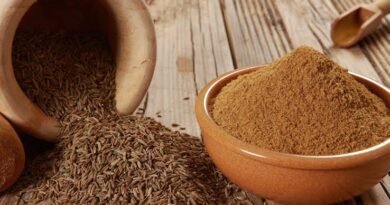10 Health Benefits Cayenne Pepper (Capsicum annuum)
Cayenne pepper (Capsicum annuum) is a plant that was once only found in tropical and subtropical areas of Central and South America. This plant produces long, hollow pods from its hollow fruit, which turn red, orange, or yellow as they ripen.
Cayenne chili peppers, commonly referred to as Capsicum frutescens, are a subspecies of Capsicum Annuum and are a member of the Capsicum genus. The capsicum plant’s fruit is used to create medication. A herb is a capsicum.
Some people use cayenne pepper as a cream or tablet in addition to adding it to meals, either organically or in powder form, to benefit from its detoxifying properties.
Cayenne peppers are a variety of curved-tipped, tapering, 10 to 25 cm long, often slender, and primarily red peppers that dangle from the bush rather than grow upright. Scoville heat ratings for the majority of cultivars range from 30,000 to 50,000.
Read Also: 7 Health Benefits of Dill Weed (Anethum Graveolens)
10 Health Benefits of Cayenne Pepper (Capsicum annuum)

1. Helps Digestion
The beneficial impact cayenne pepper has on the digestive system is one of its main advantages.
Saliva is necessary for healthy digestion and for avoiding bad breath, and cayenne pepper aid in its production. Consuming cayenne pepper may activate our salivary glands, which are necessary to start the digestion process, according to research.
In order for our digestive system to function properly, the synthesis of enzymes must also be stimulated by cayenne pepper. Additionally, it promotes stomach juices, which improve the body’s capacity to digest pollutants and meals.
2. Relieves Migraine Pain
According to research, cayenne pepper can trigger a pain response in a separate area of the body because of its spice. Once this takes place, the brain will focus on that new location rather than the head pain that is causing the migraine headache.
After the cayenne pepper causes this initial pain reaction, the pain is felt less intensely because the molecule P, or pain chemical, has been depleted in the nerve fibers.
By using cayenne ingredients, you may essentially deceive your body into thinking there is pain somewhere else, which will divert pain-inducing hormones away from the brain.
3. Prevents Blood Clot
Blockages in your arteries and blood vessels called blood clots to reduce the amount of blood that can circulate through your circulatory system.
Cayenne promotes fibrinolytic activity and aids in clot avoidance. This is also the reason cayenne pepper prevents heart attacks so well.
According to studies, the capsaicin in cayenne pepper dilates blood vessels and arteries to help dissolve lipid deposits that restrict the arteries and dissolve blood clots.
4. Provides Detox Support
The benefits of cayenne pepper include its capacity to increase circulation and reduce acidity.
Cayenne pepper improves circulation by widening capillaries and controlling blood sugar, and it also aids the digestive system in expelling bacteria and toxins from the body, according to a study reported in Critical Reviews in Food Science and Nutrition.
Cayenne pepper is said to speed up your metabolism and raise body temperature, according to research from the Netherlands.
5. Helps Reliefs Joints And Nerves Pain
When administered topically, cayenne pepper has extremely potent pain-relieving qualities. Substance P, a molecule that sends pain signals to the brain, is produced less. The brain is relieved of the pain signals when there is less substance P present.
According to studies, cayenne pepper reduces pain following operations like amputations and mastectomies. Additionally, it relieves fibromyalgia symptoms such as joint or muscle pain as well as pain from neuropathy, osteoarthritis, rheumatoid arthritis, lower back injuries, neuropathy, and pain from diabetes-related nerve damage in the feet or legs.
Read Also: 7 Health Benefits of Echinacea (Coneflower)
6. Anti-irritant
The anti-irritant characteristics of cayenne pepper make it useful for treating ulcers, upset stomachs, coughs, and may even stop diarrhea.
Cayenne pepper is thought to cause stomach ulcers when taken in large quantities due to its irritating and acid-secreting properties.
Although studies conducted recently have shown that chili, or its active ingredient “capsaicin,” is not the cause for the creation of ulcer symptoms but a benefit, people with ulcers are actually advised to limit or avoid consuming cayenne pepper.
According to studies, cayenne pepper suppresses acid secretion rather than stimulating it, boosts alkali and mucus secretions, and especially increases stomach mucosal blood flow, which aids in the prevention and healing of ulcers.
7. Treats Psoriasis
Skin cell proliferation that is excessively rapid causes psoriasis, which manifests as swelling regions beneath the skin that are coated with whitish scales. Inflammation and excessive skin production are the causes of the scaly patches.
Two studies demonstrated the efficacy of topically applied 0.025 percent capsaicin (cayenne pepper) cream in the management of psoriasis.
In the first research, scaling and redness significantly decreased during a six-week period in 44 patients with moderate to severe psoriasis.
Second, a double-blind trial including 197 patients revealed that using capsaicin cream four times per day for six weeks significantly reduced scaling, thickness, redness, and itching in psoriasis.
8. Fights Off Cold And Flu
Beta-carotene and immune-supporting antioxidants are among the benefits of cayenne pepper.
It helps break up and move clogged mucus, and as this foul mucus exits the body, the flu or cold symptoms will lessen.
Cayenne pepper works as a natural flu cure and also raises body temperature, which causes you to sweat and boosts immune system function. Cayenne pepper is a source of vitamin C and may aid in your fight against the flu.
9. Great Source Of Vitamin A
In addition to being a vital antioxidant that lowers inflammation by scavenging free radicals, vitamin A is also essential for maintaining good vision, brain function, and skin.
Antioxidants, such as vitamin A, help the health of the eyes, the immune system, and cell growth, as has been repeatedly demonstrated by studies, and they are essential for good health and life.
Fortunately for us, cayenne pepper is an excellent source of vitamin A. In fact, two teaspoons of cayenne pepper will provide you with all the vitamin A you need for the day.
10. Anti-cancer Agent
According to studies, capsaicin may be useful as a natural cancer treatment, including for the treatment of prostate cancer.
This crucial cayenne pepper component has been shown in one study at the University of California, Los Angeles School of Medicine to be able to stop the proliferation of cancer cells and stop the activation of new, risky forms.
Additionally, research from Loma Linda University in California reveals that one of the cayenne pepper’s advantages is its ability to prevent lung cancer in smokers.
The high capsaicin content of cayenne pepper acts as a chemical that can prevent lung cancers brought on by tobacco use. When liver tumors were exposed to cayenne pepper, similar effects were also observed in those tumors.
Read Also: 8 Health Benefits of Chives (Allium schoenoprasum)
Read Also: What are the Educational Requirements for Agricultural Careers?









